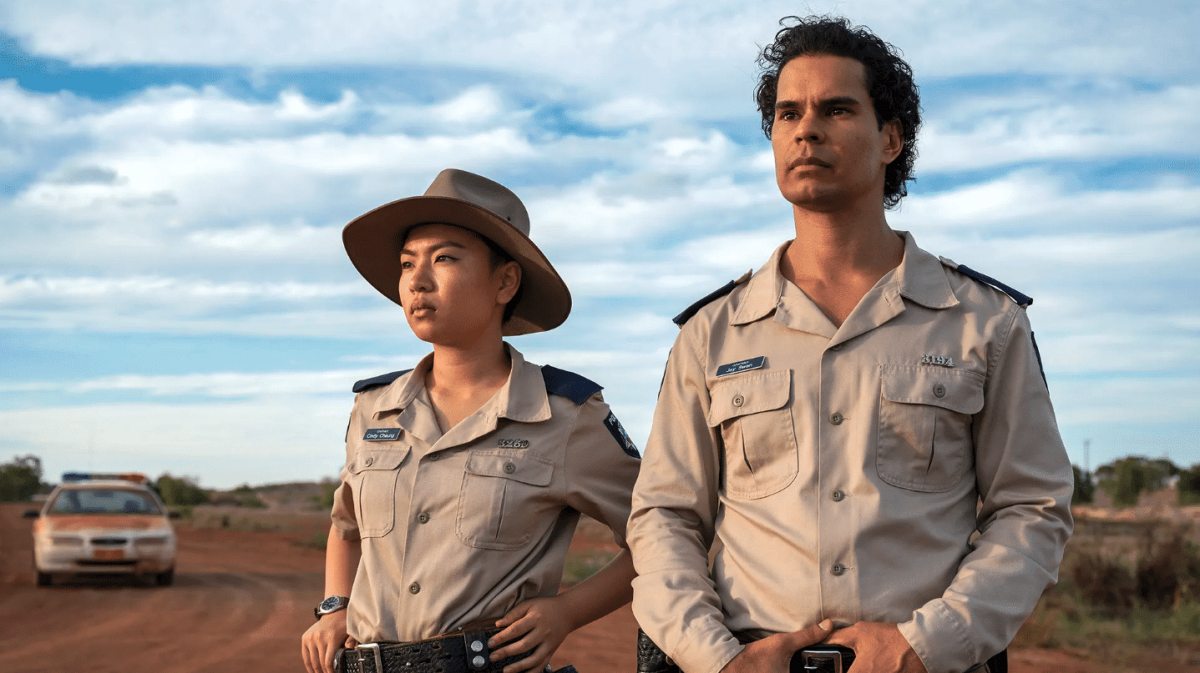Australian television had a pretty good year in 2022. Well, maybe not if you were looking for drama series on the commercial networks, but even there it wasn’t a complete drought. For one thing, Underbelly: Vanishing Act was Australia’s first prime time drama based entirely on a severed foot.
And yes, there were plenty of flops and fizzles too. It’s hard to imagine too many people getting excited about the ABC’s seemingly endless attempts [link: ] to get a news quiz series going (whether they called it Tomorrow Tonight, Win the Week or Question Everything).
Read: Win the Week? More like Things Look Bleak for the TV comedy quiz
Channel Seven’s drive to turn comedy entirely into nostalgia was also bit grim; did we really want our last memories of Kath and Kim to be of them greenscreened against their old back yard in Kath and Kim: Our Effluent Life?
Then again, it could have been worse: Housos: The Thong Warrior was also a thing that happened in 2022.
But to dwell on the darkness is to let the Housos of Australian television win – and star Paul Fenech already has a new series lined up on 7Mate for 2023 anyway. And so here, in no particular order, are what I saw as the highlights of Australian television in 2022.
Fisk season 2
We’re often told that drama is supposedly somehow superior to comedy, and yet the character work in Fisk puts most recent Australian dramas to shame. The subtle way everyone – except for Fisk herself – in Fisk doesn’t quite get along but stays in their own bubbles just enough to make society work is the kind of characterisation that would win awards if it was happening in a scenic country town with a dark past. Also, it’s very funny.
Read the ScreenHub review
Mystery Road: Origins
Early on Mystery Road: Origins is as much about character and atmosphere as it is about setting up future developments. Swan’s always a loner, but in later life he’s had demons driving him. Here he’s the same isolated, reserved character, only a little adrift, a man sleeping alone in a shabby motel because he doesn’t have anywhere else to go.
Read the ScreenHub review
The Cheap Seats
Two hosts making fun of a whole lot of news clips seems like the kind of cheap television that usually vanishes without a trace on Australian screens. There’s a lot of reasons why that isn’t the case here, but the standout is the chemistry between hosts Melanie Bracewell and Tim McDonald. They’re clearly having a good time making fun of a massive amount of silly news and television from around the world, and they know how to bring the audience in on the joke.
Read: Why do Australian TV panel shows suck? Funny answers only
The Finale of Neighbours
Yes, this massive star-studded event has since been rendered meaningless, with Neighbours (somehow? Nobody seems to know exactly what form it’ll take) returning via Amazon next year. But that final week was still a big deal in a lot of ways: the highlight was seeing big time movie star Guy Pearce not only return, but throw himself fully into being back – which wasn’t something you could say about all the big names who returned to Ramsey St.
Read: Neighbours: ten top moments as we rack off from Ramsay Street
The Tourist
We’re all used to the Outback being populated with quirky, offbeat and often sinister characters, but The Tourist has the advantage of a): a quality cast all around (including Shalom Brune-Franklin as a helpful local waitress), and b): a fast moving story that uses the humour as seasoning rather than the whole meal. This can be very funny at times – a traffic jam caused by two turtles rooting in the middle of the road is an early highlight. But the focus remains the two-fold mystery: who exactly is our hero, and why does at least one somebody want him dead?
Read the ScreenHub review
A Beginner’s Guide to Grief
Australia doesn’t have a great track record when it comes to mixing comedy with drama. This SBS Online dramedy, based on the real-life experiences of Anna Lindner (who wrote and stars in this series of six 10 minute episodes) dealing with the deaths of both her parents within days of each other, gets the balance just right. The grief hits hard; the offbeat characters and nicely observed moments bring some much-needed levity. As they say about all the best entertainment: you’ll laugh, you’ll cry.
Bali 2002
Is 20 years too soon for a drama about the Bali bombings? Enough time has passed to leave this feeling more educational than exploitative, despite the occasional rough edge. It’s the kind of drama designed to come across as important rather than entertaining, aimed at a prestige audience not usually targeted by recent Australian television.
Read the ScreenHub review
Summer Love
‘Gristmill has been exploring the line between comedy and drama since before it was popular. While the episode of Summer Love that [producers] Hope and Butler wrote and starred in is perhaps the most overtly comedic of the bunch (Hope doing a hamstring is comedy gold), even that has its serious side. Australian television needs quality drama that goes beyond small town murder mysteries. Going by Summer Love, Gristmill are exactly the ones to deliver it.’
Shaun Micallef’s Mad as Hell:
The big advantage this show has over just about everything else on Australian television is confidence. It’s a show made by people who know what they’re doing and have been left alone to get on with the job. As a result they’re taking risks (or just making jokes) we rarely see in Australia’s increasingly safe television landscape.
Read the ScreenHub review
Troppo
Based on the first of the Crimson Lake series of thrillers by Candice Fox, this mystery is initially a bit of a slow burn – as Yoon Sun Park says: ‘everyone here moves so slowly.’ Questions are asked, a clue is followed up on, there’s a brief burst of action. But nothing here is extraneous; the scene-setting all comes in handy later – even the monologue about how a croc that’s eaten human flesh starts to stink.
Read the ScreenHub review





